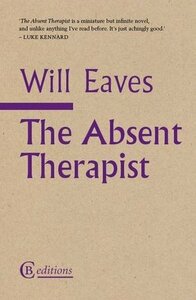Take a photo of a barcode or cover
Video review https://www.youtube.com/watch?v=EqQbTS3w3lw&ab_channel=MarcNash
challenging
reflective
fast-paced
Plot or Character Driven:
N/A
Strong character development:
N/A
Loveable characters:
N/A
Diverse cast of characters:
Yes
Flaws of characters a main focus:
N/A
Musings and passing short stories like trains of varying lengths whizzing past me on the platform. Just as I would think I might be too bored to persevere and finish it it would make me laugh, or surprise me. So finish it I did. Would be a good loo book and I don’t mean that disparagingly. Just good literature in bitesize morsels.
Will Eaves can clearly write but I'm afraid I got bored.
Because not every review can be 1,000 words long, I’m going to keep my remarks about The Absent Therapist nice and short. Just like the novel.
Except it’s not really a novel, but a collection of disparate voices, a series of vignettes that jump from person to person. It’s a bit like walking through a crowd of people, picking up fragments of what’s being discussed. Sometimes you’ll circle back and pick up another snippet of the same conversation, but for the most part, all you’ll ever get is that one moment.
What’s remarkable about The Absent Therapist is how accessible it is. While it’s obviously very experimental, and while there’s no story to take hold of, there’s a human and emotional quality to most of the vignettes that makes them immediately engaging, even if we only stay with them for a few minutes. Take this as an example:
"I don’t see the point of boxer shorts. No support. And the gap for your sticky wicket, why bother? Too fiddly. You end up groping about for the opening while your fellow man casts suspicious sideways glances. And as my beloved put it, why poke your head out of the window when you can jump over the wall?"
or this
"Samuel and I heard this morning that the refugee camp in Tanzania containing our two sons, Amos and Zizwe, is to be closed. The government is closing it and sending everyone in it back to Burundi, where we know that Amos and Zizwe will face great danger. We think of them at this time, and we would ask that you say a silent prayer for them, too."
or this
"If the vacuum were not so complete, the sound of every culture speeding by, from bacteria to late macro-sentient galactic entities, would be that of a cistern filling in the ears of the creator, the soft flare of emptiness nixed and life’s brief quelling of the silent storm, which rages on and on."
While these tonal shifts can, at times, be sudden and jarring, as Nicholas Lezard points out in his review, after awhile the prose just washes over you. This doesn’t mean that The Absent Therapist is either disposable or just a blur of words. Instead, as a glimpse into the human condition it’s a book best enjoyed as a meditative experience rather than picked apart.
Except it’s not really a novel, but a collection of disparate voices, a series of vignettes that jump from person to person. It’s a bit like walking through a crowd of people, picking up fragments of what’s being discussed. Sometimes you’ll circle back and pick up another snippet of the same conversation, but for the most part, all you’ll ever get is that one moment.
What’s remarkable about The Absent Therapist is how accessible it is. While it’s obviously very experimental, and while there’s no story to take hold of, there’s a human and emotional quality to most of the vignettes that makes them immediately engaging, even if we only stay with them for a few minutes. Take this as an example:
"I don’t see the point of boxer shorts. No support. And the gap for your sticky wicket, why bother? Too fiddly. You end up groping about for the opening while your fellow man casts suspicious sideways glances. And as my beloved put it, why poke your head out of the window when you can jump over the wall?"
or this
"Samuel and I heard this morning that the refugee camp in Tanzania containing our two sons, Amos and Zizwe, is to be closed. The government is closing it and sending everyone in it back to Burundi, where we know that Amos and Zizwe will face great danger. We think of them at this time, and we would ask that you say a silent prayer for them, too."
or this
"If the vacuum were not so complete, the sound of every culture speeding by, from bacteria to late macro-sentient galactic entities, would be that of a cistern filling in the ears of the creator, the soft flare of emptiness nixed and life’s brief quelling of the silent storm, which rages on and on."
While these tonal shifts can, at times, be sudden and jarring, as Nicholas Lezard points out in his review, after awhile the prose just washes over you. This doesn’t mean that The Absent Therapist is either disposable or just a blur of words. Instead, as a glimpse into the human condition it’s a book best enjoyed as a meditative experience rather than picked apart.
funny
lighthearted
reflective
medium-paced
Plot or Character Driven:
Character
Strong character development:
Complicated
Loveable characters:
Complicated
Diverse cast of characters:
Yes
Flaws of characters a main focus:
Complicated
Experimental fiction arranged as a collection of short, overheard pieces of conversations in five sections, the first being The Absent Therapist. All of these are absolutely brilliant. There are some very funny ones as well.
mysterious
reflective
fast-paced
The Absent Therapist is my second Will Eaves novel and like his previous book, Murmur, It’s a bundle of mixed feelings.
On one hand I think he’s a fantastic writer. I mean there’s a lot of pleasure in reading every line he writes. TAT’s structure is a series of paragraphs so the reader is getting bite sized chunks of Eaves’ prose. In theory this means that this bit and pieces should stick in your mind.
However that’s the problem I found with this book. Nothing stuck except the paragraph about boxer shorts – which made me laugh loudly on a bus. Other than that I doubt if I could recall any other part of The Absent Therapist.
That’s all I can say about it really. If you want a memorable book read in fragments then check out Brenda Lozano’s Loop. I fared much better with that.
Advertisements
On one hand I think he’s a fantastic writer. I mean there’s a lot of pleasure in reading every line he writes. TAT’s structure is a series of paragraphs so the reader is getting bite sized chunks of Eaves’ prose. In theory this means that this bit and pieces should stick in your mind.
However that’s the problem I found with this book. Nothing stuck except the paragraph about boxer shorts – which made me laugh loudly on a bus. Other than that I doubt if I could recall any other part of The Absent Therapist.
That’s all I can say about it really. If you want a memorable book read in fragments then check out Brenda Lozano’s Loop. I fared much better with that.
Advertisements
Impelled to read this as I am (slowly) making my way through all of the Goldsmith Prize nominees/winners, and because of the somewhat intriguing précis, I might have liked it better and rated it higher if I had not recently read Joy Williams' '99 Stories of God', which is virtually the same book. That is, it is composed of about 200 (more or less) vignettes of exactly one paragraph in length, with no through line, no continuing characters (although several names are repeated a few times - Linda, Clive, Darryl - and God help us - Haneke; although it is never clear if these are MEANT to be the same people from segment to segment because none of the characters are ever delineated by more than one rudimentary characteristic/emotion) - and very little discernible POINT!
One reviewer stated that the stories 'arrangement is precise', but I hazard to say the book would be no different if the 200 fragments were put into a hat and drawn out in any random order. It is like making a meal of 200 amuse-bouches with never an entrée, salad or dessert (or needful copious glasses of wine) to disrupt the monotony.
Here is what I wrote in my review of the Williams book and it serves as well for this: "About a third of these VERY short 'stories' ... are clever in a drolly dry way, a third of them are 'meh', and the final third are well nigh incomprehensible (I found myself wondering 'What's the point?' a LOT)". A week from now I could reread this and have no recollection of any of it.
One reviewer stated that the stories 'arrangement is precise', but I hazard to say the book would be no different if the 200 fragments were put into a hat and drawn out in any random order. It is like making a meal of 200 amuse-bouches with never an entrée, salad or dessert (or needful copious glasses of wine) to disrupt the monotony.
Here is what I wrote in my review of the Williams book and it serves as well for this: "About a third of these VERY short 'stories' ... are clever in a drolly dry way, a third of them are 'meh', and the final third are well nigh incomprehensible (I found myself wondering 'What's the point?' a LOT)". A week from now I could reread this and have no recollection of any of it.






